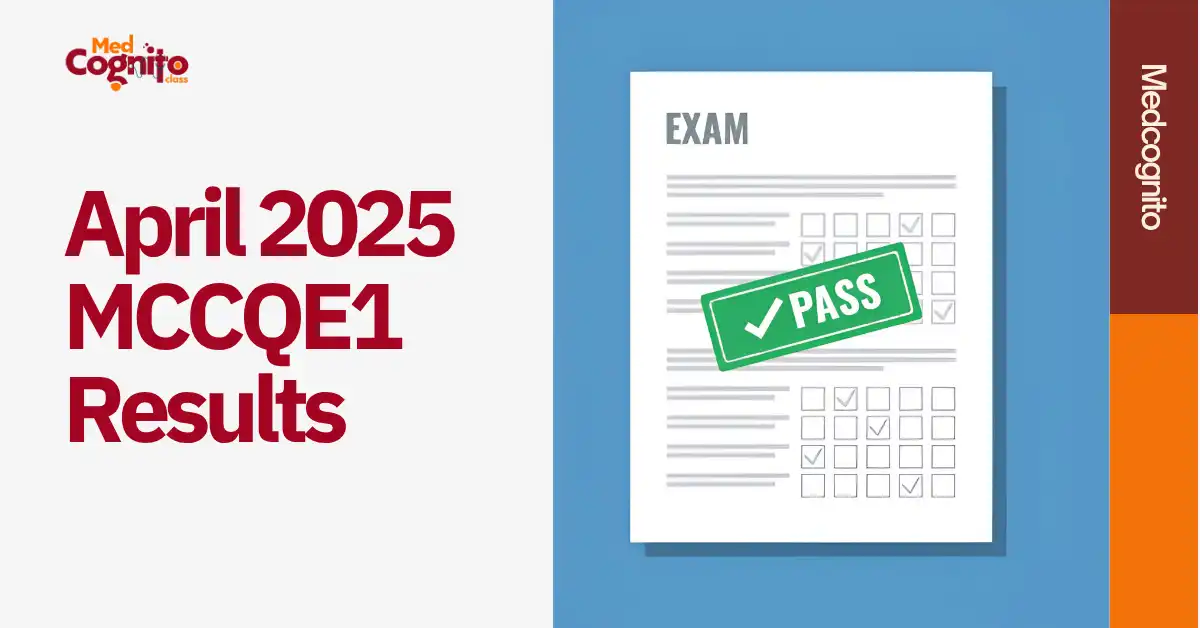The MCCQE Part I 2025 results are finally out, and the numbers are turning heads. From excited posts on Reddit to celebratory DMs in prep course WhatsApp groups, one thing is clear: a lot of people passed. But before you assume it’s because the test got easier, take a beat.
The Medical Council of Canada (MCC) rolled out major changes to the exam format and scoring system in April 2025. Gone are the old write-in questions. Gone is the 100–400 scoring scale. In its place is a new, streamlined system with multiple-choice questions only and a new pass score of 439 on a 300–600 scale.
So what does this mean for future test-takers? Let’s unpack it.
Table of Contents
ToggleWhat’s New in the MCCQE Part I (April 2025 Onward)?
In April 2025, the MCC officially launched the revised MCCQE1, bringing in a cleaner structure and a more consistent scoring system. Here’s what changed:
| Feature | Before April 2025 | After April 2025 |
| Scoring Scale | 100–400 | 300–600 |
| Pass Score | 226 | 439 |
| Question Types | MCQs + Short-Answer Write-ins | MCQs Only |
| Time Per Question | Shorter | Slightly Increased |
| Exam Length | Longer | Shorter Overall |
Why the update? The MCC cited fairness, reliability, and better alignment with medical competencies as key reasons for the overhaul.
Some Passed Results from MedCognito Students
For the umpteenth time, MedCognito successfully helped many people pass their MCCQE1 exam and here are some real pass results.
To read more testimonials, click here.
Why Are So Many Candidates Passing the 2025 MCCQE1?
It’s not a fluke, and it’s not just luck. Here’s what’s driving the higher pass rates in 2025:
1. More Accessible Format
Removing the short-answer component has made the exam less dependent on English composition or typing speed. Now, your clinical reasoning and core knowledge speak louder than your essay structure.
2. Better Candidate Experience
Improved time management per question and a shorter exam day mean less fatigue and more focus throughout the test.
3. Improved Prep Materials
With a more transparent and focused format, prep providers (including MedCognito) have been able to create more targeted and exam-relevant study tools.
4. More Predictable Content
Without the variability of open-ended questions, there’s a clearer structure to what you’re expected to know and how you’ll be tested on it.
Will This Trend Continue? Or Is This Just a Honeymoon Period?
While many are celebrating, let’s not get complacent. Exam standard-setting is a living process. As the MCC gathers more data, future adjustments may tighten the pass rate or recalibrate scoring expectations.
What does this mean? What works now might not work forever. If you’re preparing for the exam in the next cycle, don’t coast on someone else’s success. Ride the momentum, but stay sharp.
What You Should Do Now (Especially If You’re Taking the Exam Soon)
Let’s talk action. Here’s how to set yourself up for success in this new MCCQE era:
1. Study with Up-to-Date Materials: Avoid resources built for the old exam. If it still talks about short answers, skip it.
2. Practice MCQs A Lot of Them: Prioritize case-based multiple-choice questions. Time yourself. Mimic the real exam.
3. Understand the New Scoring: You’re aiming for 439 on a 300–600 scale. That means strong, consistent performance across the entire test.
4. Take a Course Built for the 2025 Format: The MedCognito MCCQE1 course has already helped hundreds pass the updated exam. Why? Because it’s built for this new version, not the one from five years ago.
Don’t Prepare for the Old Exam, Master the New One
The MCCQE Part I is evolving and so should your prep.
The 2025 results show that change, when combined with smart strategy and the right tools, can work in your favor. But don’t mistake a high pass rate for a guarantee. The bar has shifted not lowered.
So, if you’re planning to take the MCCQE1 soon, take a deep breath, update your game plan, and ensure you’re training for today’s test, not yesterday’s.
Start Preparing with Confidence
Explore the MedCognito MCCQE1 Prep Course fully updated for the new exam format.
